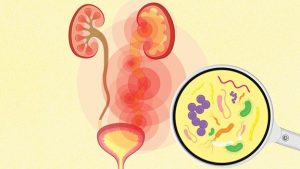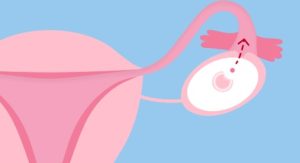Have your breasts been feeling extra sensitive lately?
You’re not alone. Many women experience breast tenderness in the days leading up to their period. Your hormones are shifting, and your body is gearing up for potential pregnancy whether you want it to or not.
Keep reading to learn how to navigate breast tenderness during that time of the month.

Managing Breast Sensitivity Across Menstrual Cycle
The fluctuating estrogen and progesterone levels during your menstrual cycle can cause your breasts to become swollen, sore, and sometimes downright painful to the touch.
The good news is there are some simple self-care strategies you can use to relieve discomfort until your period starts and your hormones level out once again. Keep on reading to get to know some more tips and tricks for managing breast sensitivity and discomfort during your menstrual cycle.
The Hormone Connection: Why Your Breasts Get Sensitive During Your Period?
Your breasts experience changes during your menstrual cycle due to fluctuating hormone levels, especially estrogen and progesterone. As your period approaches, your estrogen levels decrease while progesterone increases. This hormonal imbalance can make your breasts feel extra sensitive or even sore.
Your breasts’ tissues and milk ducts swell in response to the hormone changes, which can lead to tenderness. The swelling then dissipates once your hormone levels stabilize after your period. For some women, breast pain is most intense in the days leading up to their period. For others, the discomfort lasts through the first couple of days of bleeding.
There are a few things you can do to relieve breast sensitivity during your period:
Wear a supportive bra, especially while exercising. A sports bra can help minimize movement that aggravates your breasts.
- Apply a warm compress. The heat will help relax your breast tissues and increase blood flow to the area.
- Take an over-the-the-counter pain reliever. Ibuprofen or naproxen can help reduce inflammation that’s causing discomfort.
- Limit caffeine and salt intake, which can make symptoms worse.
- Gently massage your breasts. Massaging in small circles can provide relief by loosening tight tissues.
- Get extra rest. Lack of sleep can intensify the effects of hormonal changes. Aim for 7 to 8 hours of sleep per night to give your body the rest it needs.
With self-care and patience, breast tenderness from your menstrual cycle will pass. But if pain persists or worsens, talk to your doctor. There may be an underlying condition that needs treatment.
Managing Monthly Breast Tenderness: Tips and Tricks
When that time of the month rolls around, your breasts can feel swollen, sensitive, and downright sore. It’s annoying, but managing monthly breast tenderness is possible with a few tips and tricks.
Dietary Changes
What you eat can affect your hormonal balance and breast health. Try limiting caffeine, salt, and sugar intake which can worsen symptoms. Focus on magnesium-rich foods like nuts, seeds, beans, and leafy greens. Calcium supplements may also help.
Wear a Supportive Bra
A comfortable, well-fitting bra is key. Look for one made of breathable cotton or bamboo with molded cups for support and padding for extra coverage. Sports bras are ideal for reducing movement that aggravates sensitivity.
Apply a Warm Compress
Gently placing a warm compress on your breasts can relieve pressure and ease discomfort. Do this for 10-15 minutes a few times a day. The heat will relax tense muscles and increase blood flow to the area.
Over-the-Counter Drugs
For severe soreness, an OTC pain reliever like ibuprofen can reduce inflammation and provide relief. Topical arnica gel or creams with menthol or capsaicin may also numb the area and soothe your senses when applied as directed.
Take a Rest
Stress and lack of sleep can intensify symptoms. Try to unwind, limit stressful activities, and get extra rest. Gentle yoga or massage therapy are great ways to relax both body and mind.
With self-care and a few simple remedies, you can find comfort even on your most sensitive days. Be patient and kind to yourself. This too shall pass!
When to See Your Doctor: Red Flags for Breast Changes
While tenderness and swelling are usually normal parts of your menstrual cycle, some breast changes could signal an underlying health issue and warrant a call to your doctor. If you notice any of the following, contact your gynecologist right away:
- A lump or mass in your breast, especially if it’s hard, immobile, or painless. While lumps are often benign, it’s best to have any new mass checked out by your doctor.
- Changes in the shape or contour of your breast. If one breast suddenly appears larger or distorted compared to the other, this could indicate a problem and should be evaluated.
- Dimpling or puckering of the breast skin. Dimpled or wrinkled skin on the breast could be a sign of inflammatory breast cancer and requires immediate medical attention.
- Nipple discharge. Discharge from one or both nipples, especially if bloody, could signal a hormonal imbalance or other issue and should be checked by your doctor.
- Inverted nipple. If your nipple has recently turned inward or retracted, see your doctor. While not usually serious, it can sometimes indicate an underlying breast condition.
- Swollen lymph nodes under your arm. Swollen or painful lymph nodes in your armpit could be caused by an infection and may need to be checked to rule out other possible issues.
Don’t hesitate to contact your doctor right away if you notice these or other unusual or persistent breast changes, especially those that don’t go away once your period has ended.
While breast changes are often normal and nothing to worry about, when it comes to your health and body, it’s always better safe than sorry. Early detection of any breast condition is critical, so speak up and schedule an exam with your doctor as soon as possible.
So, there you have it, a few tips and tricks to get you through those tender times each month. Your breasts are sensitive for a reason, reminding you of the amazing yet annoying changes your body goes through as part of your cycle.
Next time your girls are feeling particularly painful or swollen, try applying a warm compress, limiting caffeine and salt intake, massaging gently with oil, and wearing a comfortable bra. Most of all, be kind to yourself. Your body is doing exactly what it’s designed to do, so take it easy and know that the discomfort is only temporary.
Before you know it, your breasts will return to their usual selves and you’ll be on to the next phase of your cycle. Stay strong, ladies! We’ve got this.







